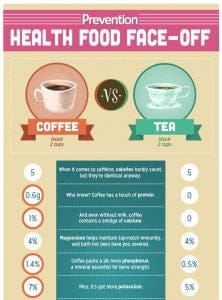In the ongoing debate between coffee and tea enthusiasts, the question of which beverage is better for you has sparked much curiosity.
Both coffee and tea offer unique flavors and potential health benefits. Still, when choosing the better option for your overall well-being, it’s essential to consider various factors.
From their respective caffeine content to their potential effects on cardiovascular health, this article explores the differences between coffee and tea to help you make an informed decision that suits your lifestyle and preferences.
Health Benefits of Coffee
Reduced risk of chronic diseases
Coffee is associated with a reduced risk of several chronic diseases. Numerous studies have indicated that regular coffee consumption is linked to a lower risk of conditions such as type 2 diabetes, Parkinson’s disease, and certain types of cancer. The beneficial effects may be attributed to coffee’s antioxidants and other bioactive compounds.
Improved cognitive function
Coffee might be your go-to beverage if you’re looking for a mental boost. Caffeine caffeine has been shown to enhance cognitive function and improve focus, concentration, and alertness. It works by blocking the inhibitory neurotransmitter adenosine and promoting the release of dopamine and norepinephrine, which are associated with improved brain function.
Increased metabolism and fat-burning
If weight management is a part of your health goals, coffee can lend a helping hand. The caffeine in coffee has been found to boost metabolism and increase fat oxidation, thereby aiding in weight loss. Studies have shown that coffee can increase the metabolic rate by up to 11%, providing a natural and safe way to burn calories.
Lower risk of depression
A warm cup of coffee may do more than uplift your mood momentarily. Research indicates that coffee consumption is associated with a lower risk of depression. The compounds in coffee, including antioxidants and phytochemicals, have been found to have mood-enhancing properties and may help reduce the risk of developing depression or alleviate its symptoms.
Protection against liver diseases
Your liver plays a vital role in detoxification and overall health, and coffee can lend a hand in keeping it in top shape. Regular coffee consumption has been linked to a reduced risk of liver diseases such as liver cancer, cirrhosis, and fatty liver disease. The antioxidants in coffee are believed to contribute to its protective effects on the liver.
Health Benefits of Tea
Rich in antioxidants
Be it black, green, or herbal varieties, tea is a rich source of antioxidants that can provide various health benefits. Antioxidants help fight oxidative stress and reduce the risk of chronic diseases.
Epigallocatechin gallate (EGCG), a potent antioxidant found in tea, has been associated with numerous health benefits, including a reduced risk of heart disease and certain types of cancer.
Promotes heart health
Drinking tea regularly has been linked to a reduced risk of heart disease. The antioxidants present in tea can help lower blood pressure, decrease LDL cholesterol levels, and improve overall cardiovascular function. Moreover, tea consumption has also been associated with a lower risk of stroke and heart attack.
Boosts immune system
Tea, especially green tea, is known for its immune-boosting properties. The catechins and polyphenols present in tea have been found to enhance the activity of immune cells, strengthen the immune system, and help protect against various infections and diseases. Regular tea consumption can provide a natural and effective way to support your immune health.
Improves digestion
If you often experience digestive issues, tea can be a soothing and beneficial beverage to include in your routine.
Certain herbal teas, such as peppermint and ginger tea, have been traditionally used to alleviate symptoms of indigestion, bloating, and nausea. These teas can help relax the digestive system, relieve discomfort, and improve overall digestion.
Reduces inflammation
Chronic inflammation is the root cause of many diseases, and tea has been found to offer anti-inflammatory benefits. The tea’s polyphenols, flavonoids, and other bioactive compounds possess anti-inflammatory properties that can help reduce inflammation. Regular tea consumption may contribute to managing inflammatory conditions and promoting overall health.
Caffeine Content
The higher caffeine content in coffee
Coffee is known for its higher caffeine content compared to tea. Coffee is often the preferred choice for those needing a quick energy boost or a way to stay alert.
On average, an 8-ounce cup of coffee contains around 95 milligrams of caffeine, depending on the brewing method and coffee bean type.
The lower caffeine content in tea
In contrast to coffee, tea generally contains lower levels of caffeine. An 8-ounce cup of tea typically provides around 25-55 milligrams of caffeine, depending on the tea type, brewing time, and preparation method.
This makes tea suitable for those more sensitive to caffeine or prefer a milder energy source.
Effect on Energy Levels
Coffee provides a quick energy boost.
Coffee can be your ally if you need an instant energy boost to kickstart your day or power through a mid-afternoon slump.
Caffeine stimulates the central nervous system, increasing alertness and a temporary surge in energy levels. The effects of coffee’s caffeine kick can be felt within minutes of consumption.
Tea provides sustained energy.
On the other hand, if you prefer a more gradual and sustained release of energy, tea can be a great choice. While tea also contains caffeine, it provides a smoother and longer-lasting energy boost than coffee.
The combination of caffeine and other beneficial compounds in tea can provide a gentle and sustained lift without the jitters or crashes often associated with coffee.
Impact on Stress and Anxiety
Coffee may increase stress and anxiety.
While coffee can help enhance focus and alertness, it’s important to note that excessive consumption or sensitivity to caffeine can lead to increased feelings of stress and anxiety.
Caffeine stimulates the production of cortisol, a stress hormone, and can potentially exacerbate anxiety symptoms in susceptible individuals. Monitoring your caffeine intake and maintaining a balanced approach is essential for managing stress levels effectively.
Tea may promote relaxation.
Tea, mainly herbal varieties like chamomile or lavender, has a calming effect on the body and mind. Certain compounds in tea, such as L-theanine, have been found to promote relaxation and reduce stress and anxiety. Enjoying a warm cup of tea can be a comforting ritual that helps you unwind and find moments of tranquility in your day.
Impact on Sleep
Coffee can disrupt sleep.
Due to its stimulating properties, consuming coffee too close to bedtime can interfere with sleep quality and disrupt your sleep-wake cycle.
The effects of caffeine can remain in your system for hours, making it harder to fall asleep and potentially leading to restless sleep. Limiting or avoiding coffee consumption in the late afternoon and evening is generally recommended to support healthy sleep patterns.
Tea can improve sleep quality.
Certain tea varieties, such as chamomile or valerian root tea, are renowned for their sleep-enhancing properties.
These herbal teas contain compounds that soothe the nervous system and promote relaxation and more restful sleep. Incorporating a cup of tea into your nighttime routine can help create a calm environment and improve sleep quality.
Effect on Digestion
Coffee may cause acid reflux and stomach upset.
Coffee consumption may sometimes lead to discomfort for individuals with sensitive stomachs or those prone to acid reflux.
The high acidity levels in coffee can trigger acid reflux symptoms and irritate the stomach lining. Additionally, coffee’s laxative effect may contribute to some individuals’ looser stools or digestive upset.
Tea can aid digestion.
Tea, mainly herbal and green tea varieties, has been used for centuries to support digestion.
Many herbal teas, such as peppermint or ginger tea, have soothing properties that can help alleviate indigestion, bloating, and other digestive discomforts. The warmth and beneficial compounds present in tea can help relax the digestive system and promote healthy digestion.
Effect on Hydration
Coffee is a mild diuretic that may cause dehydration.
Contrary to popular belief, coffee does not dehydrate you significantly unless consumed excessively. While it is true that coffee acts as a mild diuretic, meaning it increases urine production, the overall impact on hydration is minimal.
As long as you consume coffee in moderation and balance it with adequate fluid intake, it can be a hydrating beverage like any other.
Tea is hydrating
Similar to coffee, tea can contribute to your daily hydration needs. The water content in tea, combined with the absence of excessive diuretic effects, makes it a hydrating choice.
Enjoying a cup of tea throughout the day can help maintain optimal hydration levels while providing additional health benefits from the tea’s antioxidants, vitamins, and minerals profile.
Impact on Teeth and Stains
Coffee can stain teeth.
One downside of regular coffee consumption is its potential to stain teeth over time. The dark pigments in coffee, known as tannins, can adhere to tooth enamel and cause discoloration.
While regular dental care routines and visits to the dentist can help mitigate stains, it is advisable to moderate coffee consumption and practice good oral hygiene to keep your smile bright.
Certain teas may also stain teeth.
Like coffee, certain teas, such as black tea or herbal teas with dark pigments, can contribute to tooth staining.
However, tea’s staining potential is generally considered lower than coffee’s. Maintaining good oral hygiene practices and considering teeth-whitening options can help minimize and manage tea-related discoloration.
Variety and Flavors
Coffee has a wide variety of flavors.
One delight of being a coffee lover is the abundance of flavors and aromas to explore. From earthy and robust dark roasts to smooth and fruity, light roasts, coffee offers an incredible range of flavors catering to different tastes.
Coffee enthusiasts can embark on a flavorful journey with options like single-origin beans, blends, flavored syrups, and seasonal variations.
Tea offers diverse flavors and blends.
Tea is equally diverse in flavors and blends, catering to various palates. From classic black tea to delicate green tea, fragrant herbal infusions to exotic fruit and floral blends, there is a tea for every taste preference. Tea connoisseurs can enjoy exploring the nuanced flavors, aroma profiles, and regional tea specialties worldwide.
In conclusion, coffee and tea have unique health benefits, flavor profiles, and impacts on our bodies. Coffee offers a quick energy boost, improved cognitive function, and potential protection against chronic diseases.
Meanwhile, tea provides a rich source of antioxidants, supports heart health and digestion, and may improve sleep quality and relaxation.
Choosing between coffee and tea ultimately depends on personal preferences, sensitivity to caffeine, and individual health considerations. So, whether you’re a coffee lover or a tea enthusiast, there are plenty of reasons to enjoy your favorite brew and savor its benefits.








































